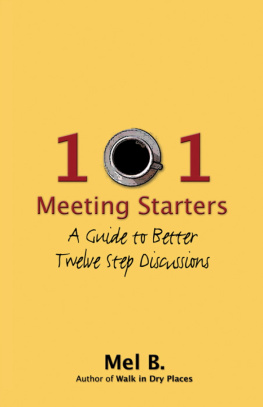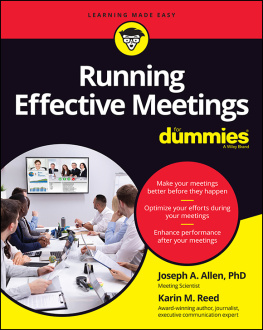 MEETING STARTERS
MEETING STARTERS
ALSO BY MEL B.:
New Wine: The Spiritual Roots
of the Twelve Step Miracle
Walk in Dry Places
Ebby: The Man Who Sponsored Bill W.
The 7 Key Principles of Successful Recovery:
The Basic Tools for Progress, Growth,
and Happiness (with Bill P.)
My Search for Bill W.

MEETING STARTERS
A Guide to Better
Twelve Step Discussions

MEL B.

Hazelden Publishing
Center City, Minnesota 55012-0176
800-328-9000
hazelden.org/bookstore
2007 by Hazelden Foundation
All rights reserved. Published 2007
Printed in the United States of America
No portion of this publication may be reproduced in any manner without the written permission of the publisher
Library of Congress Cataloging-in-Publication Data
B., Mel.
101 meeting starters : a guide to better twelve step disussions / Mel B.
p. cm.
ISBN: 978-1-59285-369-4 (softcover)
Ebook ISBN: 978-1-59285-931-3
1. AlcoholicsRehabilitation. 2. Alcoholics Anonymous. 3. Group facilitation. 4. Twelve-step programs. 5. Discussion. 6. Meetings. I. Title. II. Title: One hundred one meeting starters. III. Title: One hundred and one meeting starters.
HV5275.B2 2007
616.86106--dc22
2006046936
11 10 09 08 07
6 5 4 3 2 1
Cover design by David Spohn
Interior design by Ann Sudmeier
Typesetting by Prism Publishing Center
 MEETING STARTERS
MEETING STARTERS
Why I Prepared This Guidebook

Discussion meetings are closely tied in with AAs basic purpose of sharing our experience, strength, and hope with each other so we can stay sober and help others achieve sobriety. Certain topics and discussions support this purpose, but others have little or no bearing on sobriety and may even discourage wary newcomers from ever returning to an AA meeting. My hope is that this book will help every AA meeting get started on the right foot, regardless of how skilled the moderator or how distracted the group. My background for writing this book includes steady attendance at AA meetings since 1950. With at least ten thousand meetings behind me, Ive come to see that not all AA discussion meetings are equal in content or spirit. Some of them are frightfully boring, although the people attending can be lively and personable. Many meetings go off track quickly, perhaps because they were never firmly on track at the beginning. Moderators sometimes permit discussions to become irrelevant or allow pointless distractions.
One pitfall is to launch meetings around general subjects such as relationships or feelings. These topics are too broad to give us the focus we need for a helpful meeting. Ive never come away from such discussions with the belief that we were really dealing with our personal problems. To some people, for example, the word relationships has come to mean sexual affairs, while feelings could embrace the whole gamut of human emotions.
During one great meeting I recall, a young member admitted to the group that he had been caught shoplifting. We really worked on that topic, and the ensuing discussion allowed some of us to open up about our own past dishonesties. No one condemned the young man, but everybody agreed that shoplifting was wrong and that some amends were necessary. It was a much better meeting than if we had simply tried to discuss the need for honesty.
We also have good meetings when individual members express specific issues that are bothering them at the moment. I recall a woman who was furious because her husband had lost his job, requiring them to move to a town she detested. Resentments of this kind are grist for the AA discussion mill, and almost everybody at the table can bring up examples of similar problems in his or her own past. Discussions can also catch fire when members talk about problems at work or disagreements with co-workers. While some of these discussions may wander a bit, they are healthy because troubled alcoholics need a forum for talking about such matters in a safe environment.
There are times, of course, when certain members will drone on about matters that have little or nothing to do with staying sober. AA even attracts a few people who are badly disturbed or who obsess about certain topics. At such times, its necessary to get back to the topic at hand, but this should be done with kindness and understanding. Ive seen capable moderators break in on such monologues tactfully, changing the subject without hurting feelings.
But our best course is to start the meeting with a good topic or question that will trigger immediate responses in the people at the table. Thats why Ive written 101 Meeting Starters. The purpose of this guidebook is to get discussion meetings started in the best way so we will come away fulfilled and happy that weve had another great sharing experience.
Using this guidebook should be simple. The moderator chooses an appropriate topic, or reads a selection of topics aloud to solicit a preference from the group. The moderator then reads the text aloud to start the discussion portion of the meeting. Space has been provided after each topic for taking notes, which can serve as an aid for future discussions.
These topics are not intended to replace good ideas from group members. But they can serve a useful purpose in helping members focus on the problems and concerns that we face in the ongoing quest for continued, happy sobriety.
A Look at Willpower

MODERATOR: In AA, we dont believe that will-power can keep us sober. Most of us tried that route before we got here, and it didnt work for us. No matter how much we willed ourselves to get sober and stay that way, we always wound up drunk. This was a frustrating business, and some of us decided we were just too weak-willed to find sobriety.
But many alcoholics are very strong-willed, and this can even be part of the problem. The will is our power to make choices and carry through with them. In drinking, however, weve acquired a compulsion that makes the wrong choices. The more we fight this compulsion, the more it tightens its grip on us. (People with other compulsions understand this well, hence the saying that you cant eat just one potato chip.)
The process that seems to work for us in AA is to choose a different path with the understanding that our Higher Power is working in and through us, as well as over and above us. Our own will then becomes only the power to choose, but it is not the power that does the actual work of keeping us sober.
For this to work, we have to believe in the process and accept it for ourselves. It is simple, but it works. Now Id like to ask the group to recall efforts to stay sober on willpower alone. Most likely, these efforts worked for a time and then failed. I need a volunteer to start the discussion with an example from personal experience.

Next page








 MEETING STARTERS
MEETING STARTERS


